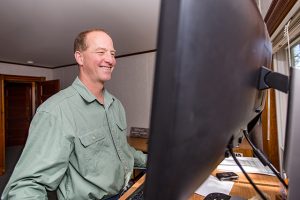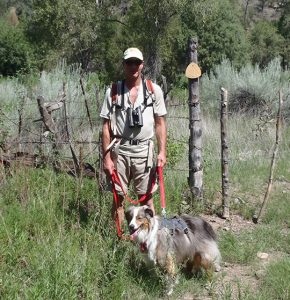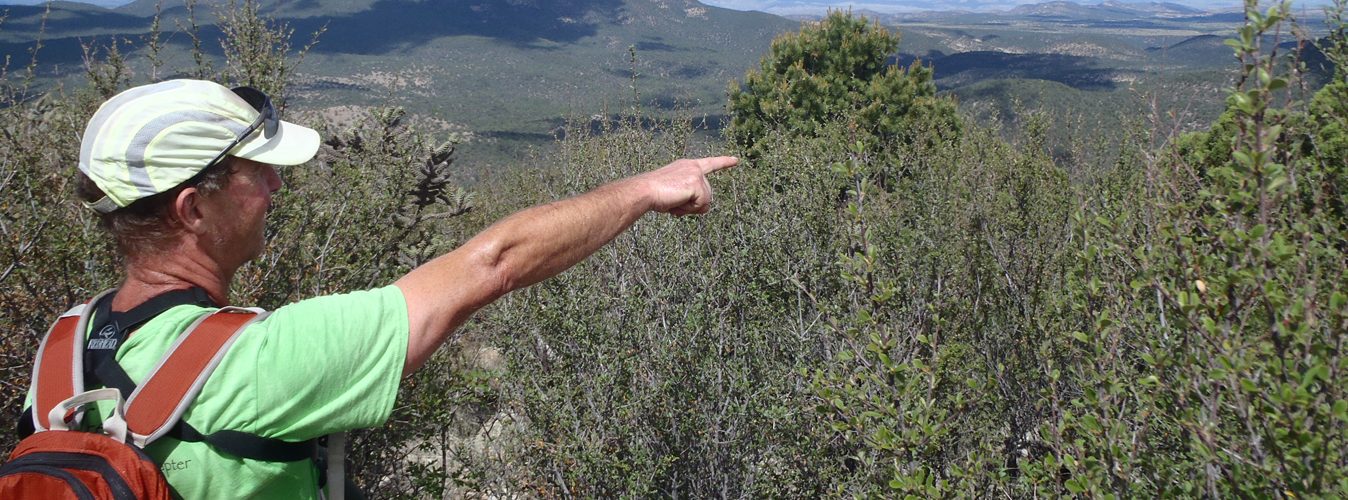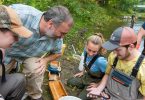Unity College’s Dr. Brent Bibles helped launch the Distance Education program, then headed west
Most mornings, Dr. Brent Bibles will wake up in his off-the-grid yurt in New Mexico just as the sun begins to rise. He gets some coffee boiling on a camp stove, maybe starts up the wood stove depending on how cold it is, tries to get in some yoga, watches the wildlife (there’s a real diversity of birds) and takes a long walk with his dog, Suki, before he settles into his work for the day.
For many, the phrase “off the grid” conjures an image of Henry David Thoreau on Walden Pond, secluded in a log cabin with few means of connecting to the outside world. Though Dr. Bibles may share some of Thoreau’s philosophies on living, he stays very well connected using the internet, which is a key component to his job. While he does live off the grid, Dr. Bibles is a professor with Unity College’s Distance Education. He uses 2.7 kW of solar panels and a radio signal-based internet setup to teach students all over the world about natural resources from his 314-square-foot structure in Silver City, NM.
“Really the only requirement for the job is that I have a decent internet connection,” Dr. Bibles said. “And I can do that.”

Dr. Brent Bibles
Prior to moving out west, Dr. Bibles taught undergraduate wildlife courses, such as habitat management, population management, and capstone courses, at Unity College’s campus at 90 Quaker Hill Road in Unity, Maine for some seven years. When the College first began exploring the concept of distance education, Dr. Bibles was in on the early conversations, and was the first full-time faculty for the online program. Leading up to the full rollout in 2017, Dr. Bibles had a hand in designing programs and championed to help get Distance Education off the ground.
When Unity College first began offering courses online, it not only gave students from all over the world an opportunity to earn a degree from America’s Environmental College, it also enabled online faculty to live wherever they wanted, no longer tethered to a campus. It also allows Unity College to seek out and enlist the services of top-tier professors and experts from all over the world to teach students.
“Once we got things settled in with Distance Education, and made sure the programs were running smoothly, I had the opportunity to basically choose where I wanted to live,” said Dr. Bibles. “I’m from the west, and spent most of my professional career in the southwest, so I wanted to be someplace where I could be more involved in research opportunities pertaining to my field, and where I have a lot of contacts already.”
“One of the most significant benefits of Unity College’s Distance Education program is that it opens up so many opportunities from both the student and faculty perspective,” said Unity College President Dr. Melik Peter Khoury. “To truly be America’s Environmental College, we knew that we needed to connect with populations across the entire country. Now, students don’t have to pick up their entire lives and move to Unity, Maine, to receive a degree from Unity College. Similarly, we can now access brilliant faculty from anywhere in the world, to enhance our online programs. And, faculty like Dr. Bibles have the opportunity to relocate if they wish, which can certainly be advantageous for them depending on their area of study. It’s truly a win-win.”

Dr. Brent Bibles on a walk with his dog, Suki.
Currently, Dr. Bibles is teaching in the graduate Professional Science programs of Sustainability Science, Sustainable Natural Resource Management and Environmental GIScience, with courses including Quantitative Methods, Human Dimensions of Natural Resource Management, and the Capstone series for those programs.
The online course schedule differs from the traditional two semesters offered through a residential education, with five start dates for the eight-week sessions. In some ways, it offers faculty more flexibility in how they use their days, but as Dr. Bibles notes, you absolutely have to check in seven days a week. The transition to Distance Education has also given Dr. Bibles the flexibility to pursue research that he otherwise might not have been able to if he had to be on campus for an entire semester.
“There are several differences,” said Dr. Bibles. “With online teaching, everything’s asynchronous. You’re not talking back and forth with students directly, so there’s more opportunity for students to reflect and to delve deeper into subjects prior to responding, especially for the graduate program. It also changes how you think about course design, and how you offer materials. When teaching in-person, it’s very easy to become more of a content provider, spouting information you want students to learn. You can’t do that in the distance environment. You have to be more intentional about course design to make sure they’re thinking about what you want them to think about.”
Possibly the biggest difference, as well as benefit, is that at any point in his day, Dr. Bibles can head outside to enjoy nature while doing work. “Often I’ll be working on my laptop outside, look up and have mule deer walking by 50 yards away. Mule deer, javelina, Gambel’s quail, Abert’s squirrels, jackrabbits, and cottontails are all daily occurrences. I’ve already had more than 18 deer sightings this morning.”






